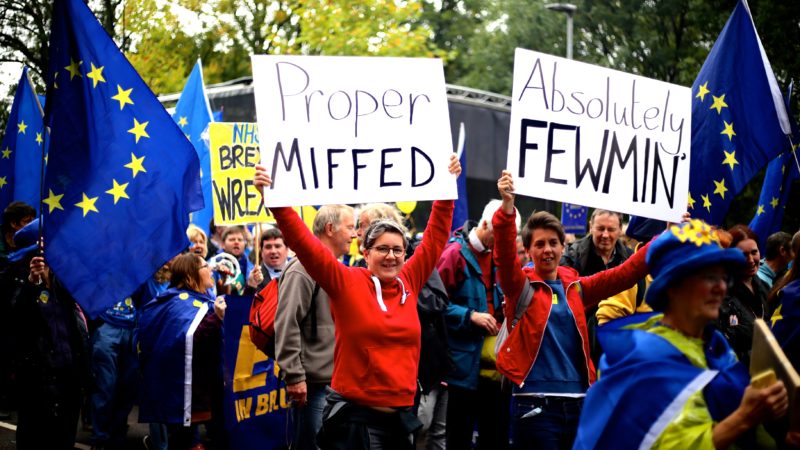In the second of a three-part article series written by For Our Future's Sake campaigners, Emily Andrew argues that Brexit is fundamentally sexist.

One of the misconceptions from the 2016 EU Referendum was that the only people who felt passionately about Europe were ‘centrists’. Over the coming weeks, campaigners for For our Future’s Sake will be putting forward the ‘Left Wing Case for a People’s Vote’.
Like lots of women in the aftermath of the historic ‘yes’ vote in Republic of Ireland, I’ve been thinking a lot in the last couple of weeks about sisterhood and solidarity.
It was hard not to be thrilled and inspired by the Repeal campaign. Conceived by women, led by women and ultimately won by women. It was innovative, inclusive, and real.
It put the 2016 Brexit referendum to shame. A dull mess, created by men, abjectly led by men and lost by men. And even the men who won (here’s looking at you Nigel Farage and company) got lost.
But the real losers of the Leave campaign were not Remainers liker Lord Rose, Brendan Barber or even David Cameron.
The real losers in the grand Brexit battle were all women in Britain.
An independent study on the impact of Brexit on women, published by the Fawcett Society and the Women’s Budget Group a couple of months ago, made clear how much women stand to lose if we leave the European Union.
Britain’s plummeting GDP – at a predicted rate of 1.5% to 9.5% – will almost certainly lead to a cut in government spending, which will adversely impact women the most. And we all know how austerity cuts to social services, from libraries to women’s centres, are already making the lives of women in Britain desperately difficult.
Then there’s the food price hike – a reality already hitting Brexit Britain – which will impact 90% of single parent households, and, by extension, affect single mothers the most.
What is worse, women’s labour rights could be rolled back under plans for a highly deregulated economy. Trade barriers are most likely to affect industries dominated by women – such as textiles and clothing – resulting in job losses.
And innumerable women’s groups, such as the Lancashire Women’s Centre (LWC), are funded by the EU. LWC alone are about to lose 15% of their funding in one fell swoop, with nothing to replace it.
Brexit was widely – and wrongly – seen as an uprising of the working classes.
If it was an uprising of the working class, it must have been one of white working class men only. Because if you’re working class, you’re far more likely to be a woman and of black or other minority backgrounds. That is to say, those who Brexit will affect the most.
Much of the Left – historically a supporter of intersectional feminism and a defender of the oppressed – appears to see the People’s Vote as a lost cause. This is an error.
You don’t have to buy into all of the European Union’s institutions, bodies and rules to know that Brexit in many ways was a vote to turn back the clock. To a time where women didn’t get to make the rules, exist in institutions or rule over our bodies. Where we were expected to listen rather than speak.
There seems to be a desire to turn back the clock before 1984, when the UK government was taken to court by the European Commission to ensure it included equal pay for work of equal value in the Equal Pay Act.
There seems to be a hope to go back to a time before strong duties on employers to protect pregnant women and breastfeeding mothers from harm in the workplace. An aspiration to revert back to a past before EU law guaranteeing women a minimum period of maternity leave, and a right to return to the same job without loss of pay.
All of these are protections won for women, by the European Union. Do we really trust those leading Brexit to protect our hard won rights?
Martin Callanan, the recently appointed Brexit minister, criticised EU legislation, such as the Pregnant Workers Directive, and labelled these protections as “barriers to employment”.
My vagina isn’t a barrier to employment, sexism is. My rights aren’t there to be traded away in post-Brexit Britain
Equal pay, maternity leave and anti-discrimination legislation are rights I have grown up to expect as a woman in this country. These are the rights my mother enjoyed and which I hope to pass on if I ever have a daughter. These are the rights we are at risk of forfeiting by leaving the EU.
If any red tape is cut at all, it will almost certainly be the safety net that surrounds women.
That’s why I’m proud to be one of many women who are a part of For our Future’s Sake, a youth and student-led campaign calling for a People’s Vote on the final Brexit deal.
If young women of all backgrounds have the longest to live with the consequences of Brexit, and the most to lose, let us not turn back the clocks, or turn our backs on our women. Let us have a final say. Let us have a People’s Vote.
Emily Andrews is the education officer at the University of Gloucestershire students’ union. She is a supporter of For our Future’s Sake.
To reach hundreds of thousands of new readers we need to grow our donor base substantially.
That's why in 2024, we are seeking to generate 150 additional regular donors to support Left Foot Forward's work.
We still need another 117 people to donate to hit the target. You can help. Donate today.



